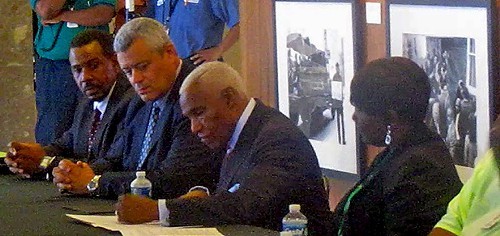
- JB
- Wharton at Monday’s premature signing ceremony
For altogether different reasons, two matters of local political importance that were on Tuesday’s agenda failed to advance.
One involved a potential decision by the Memphis City Council on whether to ratify a compromise agreement reached between the city administration and AFSCME union representatives regarding changes in city’s waste-collection procedures.
A press conference presided over by Mayor A C Wharton on Monday had given the impression that Council ratification of the agreement — involving terms that amounted to a multi-party trade-off — was within reach.
Sanitation workers represented by the union, previously lacking any pension benefits, were to get a modest retirement benefit, amounting to a maximum of $12,000 a year, based on seniority of service.
The City would be able to reduce its annual expenditures by as much as $5 million through consolidating what have been separate garbage and recycling/brush collection processes, by upping the number of collections performed by individual crews, and by reducing waste-management positions through attrition.
City residents would be assessed an additional $2.25, restoring their monthly service fee to a former level of $25.05 that had recently expired, having attained “sunset” status.
The agreement was billed as being the result of weeks of talks between Mayor A C Wharton and members of his administration, on one hand, and ASCME officials on the other, and was the subject of a symbolic signing ceremony Monday afternoon in the City Hall lobby, at which the name of Martin Luther King was invoked.
But there was a vital omission in the planning.
As it turned out, Council members were not in the loop. According to Council member Kemp Conrad — who, along with Myron Lowery, had at least attended a couple of preliminary meetings on the subject — Council members were not informed of the elaborate press conference/ceremony on Monday until just before it started. Hence, none of them were on hand.
And few Council members, if any, had expected the matter to be brought before the Council at the regular biweekly public session on Tuesday afternoon. “It’s par for the course,” said Conrad about what he characterized as a Wharton habit of proceeding on major initiatives with little or no advance warning or consultation with the Council.
The bottom line was that the issue, which received some attention — and some brisk questioning — during a morning meeting of the Council in executive session, was by general consent removed from the docket of Tuesday’s meeting. “I think we’re close to an agreement, but we have some questions, and the Council needed to be more involved,” Conrad said.
Mark this one down as a setback — a fiasco, even — but one that can be righted, possibly even before the next regular Council meeting.
Another process under way on Tuesday turned out to be somewhat less than ripe, as well. It involved an ethics complaint filed by Shelby County Commissioner Terry Roland against Commission colleague Sidney Chism regarding an alleged conflict of interest in violation of a 2009 ethics code adopted by the Commission.
Roland alleges that, in voting for county appropriations, Chism improperly failed to disclose the receipt of county “wraparound” services (involving medical and dental checkups and other Head Start funding) by a South Memphis day care center he owns.
An Ethics Commission appointed by the county at the time the ethics code was adopted has met twice on the matter and was scheduled to convene Tuesday afternoon, presumably to deliver its verdict on the matter.
The mere fact of the complaint played a significant role in the Commission’s budget and tax rate deliberations this year, in that Roland, an opponent of proposed increases in both, challenged the propriety of Chism’s taking part in votes on the two issues.
For his part, a cautious Chism, a proponent of County Mayor Mark Luttrell’s proposals for increasing the budget and county tax rate, did in fact avoid voting on the latter until the recent announcement by the administration of the Unified School District that the wraparound funds would not be disbursed in the coming fiscal year.
A late contribution to the case was an amicus curiae brief filed with the Ethics Commission Monday by former commissioners Joe Ford, Joyce Avery, and Deidre Malone, and current commissioner Steve Mulroy.
The brief, prepared by Mulroy, argues against a contention by special counsel Brian Faughnan that state law, which has provisions regarding both direct and indirect benefits, should supersede the county code, which, as the brief indicates, specifically excludes indirect benefits as an infraction of the code.
Chism has maintained that any benefits received by his day care center were, in fact, just that — indirect ones.
Included in the brief are generous excerpts from dialogue between commissioners at the time the ethics code was being promulgated in 2009. Typical was a comment at the time from Commissioner Wyatt Bunker warning against “politically motivated charges” that could result from the inclusion of indirect benefits as an actionable condition.
As it turned out, all that got dealt with on Tuesday were some matters involving the process of discovery. The members of the Ethics Commission indicated they still had much to sift through, and more meetings would be necessary before any judgment could be rendered.
Like the Council matter, that show is not quite ready for the final act.